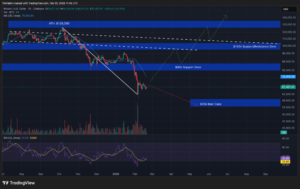Last updated:
 Why Trust Cryptonews
Why Trust Cryptonews

The U.S. Department of Justice (DOJ) has charged Maximiliano Pilipis, the operator of crypto exchange AurumXchange with money laundering related to Silk Road transactions.
According to the DOJ’s statement on October 28, Pilipis allegedly processed millions of dollars through AurumXchange, with a portion tied to accounts linked to Silk Road, a notorious darknet marketplace.
Silk Road, founded by Ross Ulbricht (known online as “Dread Pirate Roberts”), operated between 2011 and 2013 as an anonymous online marketplace on the Tor network.
It became infamous as a hub for illegal drug sales.
Pilipis Ran AurumXchange for 4 Years
Pilipis, 53, reportedly ran AurumXchange from 2009 to 2013 without the necessary license, overlapping with Silk Road’s years of operation.
The DOJ alleges that over $30 million across approximately 100,000 transactions flowed through AurumXchange, including 10,000 Bitcoin—worth about $1.2 million at that time.
Pilipis faces accusations of bypassing essential federal regulations for cryptocurrency exchanges.
He allegedly failed to register AurumXchange with the U.S. Treasury Department and neglected to report the exchange’s activities, as required by law.
Furthermore, the DOJ claims that Pilipis did not implement Know Your Customer (KYC) protocols, thus violating Anti-Money Laundering (AML) and counter-terrorism financing (CTF) requirements.
Following AurumXchange’s closure, authorities say Pilipis attempted to conceal his profits by splitting and transferring Bitcoin and other assets.
The DOJ alleges that he converted cryptocurrency into U.S. dollars, using the funds for real estate investments in Arcadia and Noblesville, Indiana.
In addition, authorities report that Pilipis’ assets generated substantial income in 2019 and 2020, yet he allegedly failed to file tax returns for those years.
The federal grand jury has now charged Pilipis with five counts of money laundering and two counts of willfully failing to file tax returns.
If convicted, he could face a prison sentence of up to 10 years and a maximum fine of $250,000.
Supreme Court Declines Case on Seized Bitcoin from Silk Road
Earlier this month, the United States Supreme Court decided not to hear a case involving 69,370 Bitcoin, valued at $4.38 billion, seized from the Silk Road dark web marketplace.
Battle Born Investments, a company claiming ownership of the Bitcoin, sought a review from the Supreme Court.
The firm argued that it had acquired the rights to the seized Bitcoin through a bankruptcy estate.
However, the Supreme Court’s refusal to take up the case leaves the government’s control over the cryptocurrency largely uncontested.
The decision also paves the way for the U.S. government to sell the significant Bitcoin stash.
The legal dispute began when Battle Born Investments asserted that it obtained the Bitcoin through a bankruptcy claim after the closure of Silk Road in 2013.
It alleged that Raymond Ngan, a debtor in the bankruptcy proceedings, was the mysterious “Individual X” who had illicitly taken billions of dollars worth of Bitcoin from Silk Road.
Despite these claims, the courts have consistently ruled against the company.
In 2022, a district court ruled that Battle Born did not have a legitimate claim to the Bitcoin.
The following year, an appeals court in San Francisco upheld this decision, concluding that the firm’s claims were not legally valid.

















